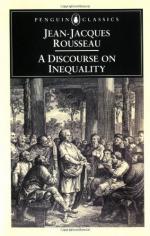
|
| Name: _________________________ | Period: ___________________ |
This test consists of 5 multiple choice questions, 5 short answer questions, and 10 short essay questions.
Multiple Choice Questions
1. How are virtue and learning related according to "Chapter 1, A Discourse on the Moral Effects of the Arts and Sciences, Part I"?
(a) Virtue exitsts without knowledge of it.
(b) One must learn to understand virtue.
(c) They are polar opposites.
(d) They are contradictory.
2. What does Rousseau see as possibly contradictory in "Chapter 1, A Discourse on the Moral Effects of the Arts and Sciences, Part I"?
(a) Morality and learning.
(b) Virtue and morality.
(c) Virtue and learning.
(d) Learning and ignorance.
3. What was the state of France, according to Rousseau, as a result of the introduction of the arts and sciences?
(a) The arts and sciences were only a luxury.
(b) The needed the arts and sciences.
(c) They discovered that they were better off in their ignorance.
(d) The arts and sciences were a detrimental luxury.
4. Why does Rousseau believe the arts and sciences are responsible for the fall and collapse of human's morality?
(a) The improve well roundedness.
(b) They corrupt human importance.
(c) They negate human reason.
(d) They corrupt human thought.
5. What does Rousseau believe is an artist's greatest compensation for his labor?
(a) Praise.
(b) Money.
(c) Admiration.
(d) Display.
Short Answer Questions
1. Who does Rousseau thank at the beginning of "Chapter 3, A Discourse on the Origin of Inequality, Dedication and Preface"?
2. What does Rousseau exhort his citizens NOT to do?
3. What was the result of the arts and sciences becoming despotic, according to Rousseau?
4. What does Rousseau say the size of the state should be in order to propose laws freely?
5. Who is Rousseau saddened by in "Chapter 3, A Discourse on the Origin of Inequality, Dedication and Preface"?
Short Essay Questions
1. How did the arts and sciences directly effect France, according to Rousseau?
2. Discuss how Rousseau views passions and sensation in "Chapter 4, A Discourse on the Origin of Inequality, Part One".
3. Explain what Rousseau suggests about mankind's living quarters in their earliest stage.
4. Discuss Rousseau's opinion on taxation.
5. What does Rousseay describe the "social man"as?
6. Describe the type of land Rousseau states he prefers to live in in "Chapter 3, A Discourse on the Origin of Inequality, Dedication and Preface".
7. Where does Rousseau believe many civilizations believe science arose from according to "Chapter 2, A Discourse on the Moral Effects of the Arts and Sciences, Part II"?
8. Describe how Rousseau feels about property rights according to "Chapter 5, A Discourse on the Origin of Inequality, Part Two".
9. Explain how the revival of the arts and sciences affected society according to Rousseau in "Chapter 1, A Discourse on the Moral Effects of the Arts and Sciences, Part I".
10. What are the effects of idleness on humanity, according to "Chapter 2, A Discourse on the Moral Effects of the Arts and Sciences, Part II"?
|
This section contains 818 words (approx. 3 pages at 300 words per page) |

|




